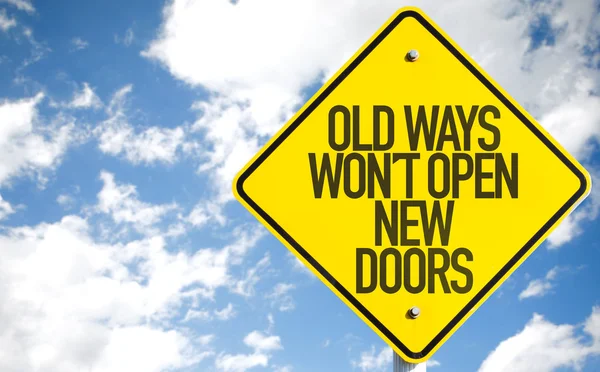
Old Ways Won’t Open New Doors
There is a hard truth that I think we all know, but that we, or at least I, spend a fair amount of time denying. Change is inevitable. Change is inevitable and at times it is profoundly uncomfortable. My observation is that most people want to believe they are ok with change. We all want to believe that we’re secure enough, or hip enough, or enlightened enough to tolerate, if not embrace, change. And, the truth is we probably are, some of the time, about some things.
Let’s face it, if we are honest, the idea of a “who-knows-what future” can be frightening. And for some of us, those living closer to the edge, those who are facing a lot of loss, change can feel even more threatening. So, it is no wonder then that organizations facing change sometimes find themselves meeting resistance and confusion.
In our Unitarian Universalist communities, we start many gatherings by lighting a flaming chalice – a bowl, with a candle, oil, or battery tealight to symbolize something of our community ideals. The open bowl reminds us of the space for personal understanding that lies at the core of our tradition. To that we add a flame, symbol of change and transformation. One of our key rituals reminds us that we gather, with different understandings with a collective aspiration to be changed by the encounter. We remind ourselves of this, and we, inevitably, fall short. Change is hard work. We can aspire to be changed, and we can, because we are so very human, resist it.
Intellectually we know that change is inevitable, but too often we resist it, instead holding on to old and familiar patterns. The people who came to our community organizations and who stayed, did so, presumably because what they found there worked for them. But things are changing, and so many volunteer organizations, including congregations, have acted as though that is not true. One only has to travel through any town, of any size, in Canada to see repurposed church buildings. Congregations, once important to their members, have dwindled, and in their place are coffee shops, homes, day care centres and more. There are still service clubs, and social groups, but there are fewer than there were. “Oh”, we say, “people are busier than they once were, and so churches and other community organizations have fallen out of favour.” Is that true? Am I busier than my farmer great-grandparents, the ones who had seven children and who still found the time to volunteer as church elders and Sunday-school teachers? I suspect not. What I believe to be true is society has changed and many of those former congregations failed to adapt, instead doing their best to shore up the status quo, even when the status quo wasn’t what the people both inside and outside of their organizations were looking for.
Never have I heard an organization say its purpose was to become obsolete, or that its values were to make people feel safe and comfortable. Congregations and most communities exist to make a difference – both in the lives of their members and in the larger communities they serve. A quick scan of the websites of the Canadian Unitarian Council and some Canadian congregations leads to an understanding of how we want to be in the world:
- we envision a world in which our interdependence calls us to love and justice,
- empower people to live with greater depth, meaning and purpose. We welcome all to our caring community,
- inviting all people to rest, grow, and serve the world.
Yet, too often our actions don’t align with those statements. It seems the gap between values and purpose and action is common.
Edwin Friedman, a rabbi who applied Family Therapy insights with organizational structures reflected that too often leaders spend their time trying to do the safe thing, instead of on the thing that will move them further towards a realization of their goals and values.
This focus on safety has become so omnipresent in our chronically anxious civilization that there is real danger we will come to believe that safety is the most important value in life. It is certainly important as a modifier of other initiatives, but if a society is to evolve, or if leaders are to arise, then safety can never be allowed to become more important than adventure. (Friedman, pg. 91) |
These are trying and troubled times. There is much that makes a retreat to old patterns and their perceived safety seem compelling. But we know that these trying and troubling times call for new responses. We don’t want to spend our time shoring up structures that don’t work anymore. Loren Mead, another organizational consultant who specialized in religious community, said, “every generation is tempted to preserve the structures rather than the insights of the previous generation…the critical task is to break through the structures and help the insights—if they are still viable—find structures more adequate for a new time.” (Alban Nov. 2011)
So, what is a leader to do? Organizations resist change, even when the change is an ever-present reality. There is no staying the same, try as we might. It is hard, and for many of us the answer is easily found. Open your website, look at your brochure, read your mission statement. Almost all organizations have already said what they want to do and achieve and how they want to be in the world. The work of the leader is to remind people, likely starting with themselves, of where it is they intend to go. And then, take a breath, together, and begin the work of being the club, or school or congregation that you know you want to be. Outcomes are not certain. The work of change, of living into ideals is hard, because even as you start, having assessed the situation, things will change again. It is an adventure, and in my experience, adventures are better undertaken with friends.
***
Call and Response, the Canadian Unitarian Council’s new blog, is a forum for sharing ideas, tools, and resources with people and organizations who want to create a more loving, just, and equitable world.
Rev. Linda Thomson is the Canadian Unitarian Council Congregational Life Lead, Central & East Regions. She and Rev. Anne Barker are facilitating workshops on Working Well Together: Congregational Workshops for Resilience and Renewal on November 25, 2023.
Bibliography
Friedman, E. (1997). A Failure of Nerve: Leadership in the Age of the Quick Fix. New York: Seabury.
Wisdom from Loren Mead. (2011, November 9). Retrieved from Alban at Duke Divinity School:
Subscribe to the CUC Blog Call and Response

